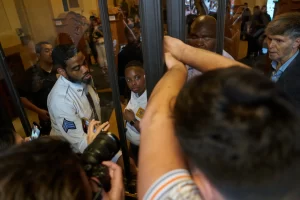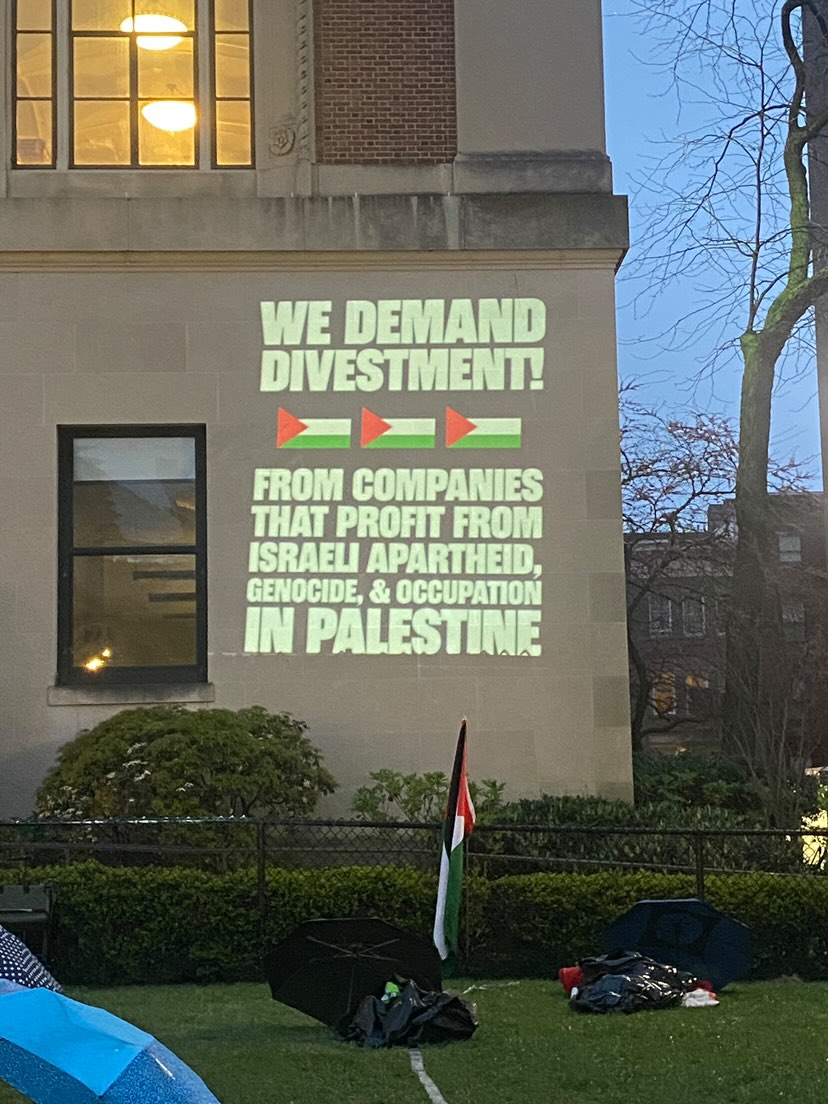On Wednesday, May 7, 2025, Columbia Public Safety officers clashed with pro-Palestinian protesters during a demonstration in the University’s Butler Library. Reports from Columbia’s student newspaper, the Columbia Daily Spectator, state that officers forcefully pushed demonstrators in an attempt to contain and redirect them. 75 student protesters were later arrested by the New York Police Department (NYPD), 65 students were suspended and 33 individuals involved in the demonstration were barred from campus.
“These actions not only represented a violation of University policies, but they also posed a serious risk to our students and campus safety,” University President Claire Shipman said in an official statement. Shipman also praised the “professionalism” of NYPD and Public Safety officers.

photo courtesy of The New York Times
Two individuals were subsequently led off of campus on stretchers by Columbia University Emergency Medical Service, and at least one medical service provider tended to a protester in the library reading room. Shipman wrote in a statement that two Public Safety officers were injured when protesters “attempted to force their way” into the library. The Columbia Palestine Solidarity Coalition claimed on Instagram that several student protesters were hospitalized after the event, sharing video of students being choked or shoved by officers.
In the last several months, Columbia University has massively increased their on-campus security. On March 21, the University announced it would hire 36 additional Public Safety officers, 25 of which are currently deployed.
Some students are not in favor of the increase in police presence on campus. “No one really wants police here,” one Columbia undergraduate said. “There was a big survey that was done, and I think it was 75 percent of students who were like, ‘I do not want police on campus’”. A March article from the Spectator confirmed that the University Senate sent a poll to students gathering feedback on campus access, campus security and a previously proposed mask ban, but did not include the results of this poll.
Columbia has restricted campus access since the beginning of this academic year, limiting entrance to Columbia University ID holders and approved guests of Columbia students or faculty/staff. One Columbia graduate student believes this change has negatively altered her on-campus experience. “You can’t step foot onto campus without this subtle sense of oversight, bureaucracy and security…it’s sad because it cuts you off from the community at large,” she said. “Campus doesn’t feel warm, welcoming and easeful in the way that it always has.”

photo courtesy of The New York Times
These changes are primarily in response to allegations of antisemitism against the University, which triggered the Trump administration to revoke $400 million in federal funding. “Any college or university that allows illegal protests and repeatedly fails to protect students from anti-Semitic harassment on campus will be subject to the loss of federal funding,” a press release from the Trump administration reads.
On March 13, the Trump administration sent a letter to Columbia with numerous demands as a “precondition for formal negotiations regarding Columbia University’s continued financial relationship with the United States government.” Requested policy changes include: a mask ban, increased disciplinary action against protesters, centralization of disciplinary processes within the office of the president, admissions reform, the adoption of the International Holocaust Remembrance Alliance (IHRA) definition of antisemitism and to put the Middle East, South Asian and African Studies (MESAAS) department under academic receivership.
Columbia has taken serious action in response to the Trump administration’s demands. In late March, the University announced plans to ban some masks on campus and to place the MESAAS department and Center for Palestine Studies under the purview of a senior vice provost.
The University Judicial Board (UJB), a University-wide panel that hears allegations of violations under the Rules of University Conduct, was similarly resituated within the Office of the Provost, who reports to Columbia’s president. The UJB has issued multi-year suspensions, expulsions and temporary degree revocations for students involved in last year’s “Gaza Solidarity Encampment.”

photo courtesy of anonymous Columbia student
One Columbia professor, Dhananjay Jagannathan, believes the Trump administration’s demands are harmful to Columbia’s institutional priorities as a center for academic exploration, particularly in relation to the loss of research funding. “Attempting to demoralize and discourage academics, to tear down universities as independent centers of authority in society…is really harmful to intellectual curiosity,” he said.
Jagannathan also believes the Trump administration’s attacks have affected learning in the classroom. “People are afraid of even just exploring an idea, which is an essential part of the learning process,” he said. A Columbia undergraduate expressed similar sentiments. “A lot of students are just tired of the tactics that the school administration is using to limit people’s freedom of speech and expression,” she said.
Additional reports show the usage of excessive surveillance by Columbia to respond to student activism or discipline demonstrators. In partnership with law enforcement, Columbia’s Public Safety department routinely monitors social media platforms to gather information about potential demonstration activity.
A September 2024 article in the Spectator claims that Columbia officials hired private investigators to look into unauthorized student meetings, and that they used surveillance technology to identify students who participated in demonstrations. “People are feeling a sense of threat… in a way that is genuinely unprecedented and I think a lot of that is due to the technological surveillance,” Jagannathan said.
Some students believe that Columbia’s administration does not completely reflect the desires and beliefs of students. “There’s this rift between how students feel and how admin acts,” one Columbia undergraduate said. Another Columbia undergraduate agreed. “A large majority of us are disappointed in the school that we go to,” she said.
In spite of recent events, students are still amplifying their experiences, opinions and perspectives. Pro-Palestinian activists continue to demonstrate on Columbia’s campus in spite of potential consequences. Student journalists have also been instrumental in bringing light to the student experience, and student activism. “Back in April when Columbia shut off its gates to outside journalists…our team [was] one of the first to break the news of Hamilton getting occupied,” Daily Spectator University News deputy editor, Joseph Zuloaga, said of the newspaper’s coverage of the 2024 occupation of Columbia’s Hamilton Hall.
The graduate student shared that she believes the current campus climate has united some students. “There’s a sense of camaraderie on some level that maybe wouldn’t be there otherwise,” she said.
One Columbia undergraduate is finding hope in the bravery of her classmates. “Even as things were going on last semester I was motivated to come to this school because of the students, and the courage of the students,” she said. “Given what is happening right now I continue to be inspired by my peers.”








+ There are no comments
Add yours